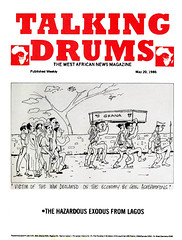Power to the People
Reflections on retrogressive politics
Title: Power to the People: Reflections on Retrogressive Politics. Author: Kodjo Crobsen. Price: £3.50
The overall picture that emerges from this very personal reflection on the politics of the independent state of Ghana, is very bleak indeed. Mr Crobsen is saying Ghana is in a desperate state but all the wounds are self-inflicted. He puts the blame very squarely on "all the governments and regimes we have had so far".But Mr Crobsen still manages to raise smiles and even the occasional laugh in his telling of the Ghana story possibly because of his chosen method of telling his story - poetry and cartoons.
He says himself in the preface that "the emphasis has been on the retrogressive policies and negative decisions of the various governments and regimes. This does not mean that they do not have anything to their credit.
It is more because in Ghana, we over-praise our leaders for their achievements and so long as they wield power, we tend to praise them for their mistakes too".

Mr Crobsen obviously is not about to "over-praise any of Ghana's leaders and he highlights their foibles with devastating accuracy. Underlying it all is the anger of a nationalist who believes that Ghana has not right to be in its present state.
Again from the preface, the author says "the greater portion of this book has been devoted to the present regime for one main reason; the past we can no longer influence and hence it should not preoccupy us unduly. It is the present that we hope we can so that it makes the future less traumatic. However, if we can all keep the past clearly in focus, then hopefully we can avoid the same or similar pitfalls, despite Hegel's scepticism about the lessons of history".
Many people might disagree with the selection of incidents that Mr Crobsen makes and his emphasis on such events. Maj-Gen E. K. Kotoka and Lt- Gen A. A. Afrifa for example deserve a more historically rounded view than the stereotype "originators of all our woes as those who introduced coups to Ghana", but then the present has a way of showing the past in different perspectives.
There is a strong religious streak running through the book; emphasized by "The Prayer" which starts the book, through the short biblical quotations that introduce each chapter and to the progressively bigger and louder cry of the angel who states as things get worse and worse "at this point, subsequent horrific events were still reversible". But this is far from a religious tract, it is a social commentary, savage in parts but at all times, humorous.

"If Ghanaians in their collective wisdom or stupidity choose one party to rule for four years, no individual (or group) has the right to assume the duty of judging the performance of the party in power and then deciding to remove that government from office..."No head of state can legitimately claim to be more Ghanaian or love Ghana more than other Ghanaians. Now if our heads of state, elected, appointed or self-appointed, see their burning love of Ghana as the driving motor behind many of their actions, then they should not deny their fellow- citizens also the same burning love of Ghana, or the right to say what they feel about Ghana and how they think Ghana should be run. No head of state - neither those with the legitimate mandate of the people, nor those with a sham mandate, and even less so the usurpers should take away the right of the people to speak out...

Being heads of state does not give them the right to decide for us "the time to speak and the time to keep silence". And so Mr Crobsen has chosen to speak out, and at the end he leaves no doubt as to where his own biases lie: "If Ghanaians in their collective wisdom or stupidity choose one party to tule for four years, no individual (or group) has the right to assume the duty of judging the performance of the party in power and then deciding to remove that government from office. ... Our Burma camp warriors and retired warriors need to take note that Ghanaians don't buy the khaki and guns for them to use every two or so years to molest and harass them . . . Nations need peace and stability in order to develop".
Like the country it seeks to portray, this book's redeeming feature lies in the ability for the wit and humour to emerge no matter how depressing the subject matter. Consider the exposition on the gun. "The Gun cannot rule.' It is not really true that the gun cannot rule... all Ghanaians have to realise the simple fact that you do not necessarily need a head to rule. E.O.

Arrangements for the distribution of the book are still in progress and a comprehensive list of outlets where it is available will be published in TALKING DRUMS next week.
TOWARDS CONSTITUTIONAL RULE
Nobody is satisfied with the forms of government that exist in most West African countries presently.Even in those countries where there is yet no official sanction about discussion of what form of government to aspire to, there is still the acknowledgement that the present situation is unacceptable.
Some other countries have officially launched a search for this system that will bring the stability needed for the development of the countries.
As a result of numerous letters on this subject from readers, we intend to start a column under which the matter can be fully discussed and all the ideas aired and debated. We hesitate to use the word DEMOCRACY not only because it is so emotive and overused, it appears to mean too many different things to too many people.
Whatever your views or ideas send them to The Editor, 68 Mansfield Road, London NW3 HY
